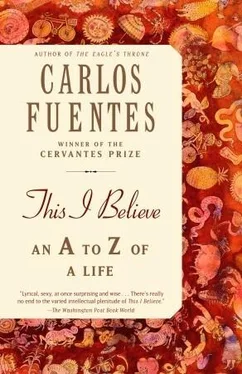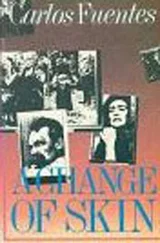The gaze is the essential ticket of love. As the saying goes in Spanish, love enters through the eyes. And it is true: when we fall in love, we have eyes for no one but our beloved. One night when I was in Buenos Aires I discovered — not without a mixture of modesty, poignancy, and shame — yet another dimension of the amorous gaze: its absence. Our friend Luisa Valenzuela had taken my wife and me to a tango bar on the endless Avenida Rivadavia. It was a genuine dance hall — no tourists, no light shows, no paralyzing strobe lights. A popular neighborhood haunt, with its orchestra of piano, violin, and accordion. Everyone sitting on chairs lined up around the perimeter of the wall, like at a family party. Couples of all ages and sizes. And a queen of the dance floor. A blind girl, in dark glasses and a flowered dress. The reincarnation of Delia Garcés, the fragile Argentine actress. She was the most sought after dancer in the place. Resting her white cane on her chair, she would get up to dance without seeing but being seen. She was a marvelous dancer. She evoked the tango exactly as Santos Discépolo defined it: “a sad thought that is danced.” It was a lovely and strange kind of love that was danceable in both light and darkness. Half-darkness, yes.
In time, the crepúsculo interior or “interior twilight” of the Do-nato and Lenzi tango also teaches us that it is possible to love the imperfection of one’s beloved. Not despite the imperfection but because of it. Because some specific shortcoming, an identifiable defect, makes the person we love that much more adorable; not because it makes us feel superior — the Greeks, in fact, punished hubris as a tragic offense, not just against the gods, but against human limitations — but rather because of the very opposite, because it allows us to admit the things that we ourselves lack and, as such, compensate for with someone else. This is different from the form of love that can be defined as the will to love: an ambiguous condition that can wave along with the flags of solidarity, but can also show off the rags of self-interest, cunning, or that brand of friendship-out-of-convenience that Aristotle so aptly described. We would do well to distinguish very clearly between these two forms of love, because the first is an exercise in generosity while the second revolves around egotism.
“A perfect egotism between two people” is Sacha Guitry’s very French definition of love, placing a rather ironic twist on intimacy. On the one hand, shared egotism implies accepting, tolerating, or remaining discreet in the face of the many miseries that, in the words of Hamlet, “flesh is heir to.” But, on the other hand, bald egotism — radical, miserly solitude — implies both separation from the other as well as separation from oneself. There is always someone who will say that the greatest moment of love is separation, loneliness, the melancholy of remembrance, the solitary moment. . And this situation is certainly preferable to the melancholy of a love that never existed — out of shyness, indifference, or haste. There wasn’t the time, we say to ourselves. There wasn’t the time for the last word. There wasn’t time to say so many things about love.
Love, whether it is will or habit, generosity or imperfection, beauty and plenitude, intimacy and separation, is a human act that pays, as do all human acts, the price of finality. If we make love the worthiest goal and most worthwhile pleasure of our lives, it is because in order for it to exist at all (or perhaps because it does in fact exist) we must envision it as limitless precisely because it is so fatally limited. Love can only conceive of itself without limit. At the same time, lovers know that their love has limits — even if they are blinded by passion and deny this — if not in life then surely in the death that is, according to Bataille, the empire of true eroticism: “The perpetuation of a love more intense in the mortal absence of the beloved.” Cathy and Heathcliff in Wuthering Heights, Pedro Páramo and Susana San Juan in Juan Rulfo’s novel Pedro Páramo. But in life itself, can even the most absolute, abundant love ever fully satisfy us? Don’t we always want more? If we were infinite, we would be God, the poet tells us. But we want, at the very least, to love infinitely, for this is our only possible brush with divinity. It is our gaze of farewell and our gaze upon God. Dios y adiós.
I hope the reader of this book will discover the various kinds of love that are contained in each chapter of my personal alphabet. There is one kind, however, that I would like to highlight so as always to keep it present in my mind. I refer to the quality of attention. Love as attention. Paying attention to the other person. Opening oneself to attention. Because extreme attention is the creative faculty, and its condition is love.
Agnes Heller, the philosopher of Hungarian extraction, writes of how ethics are concerned with the personal responsibility we assume on behalf of another person; our response to the call of the other. All ethics culminate in a morality of responsibility: we are morally responsible for ourselves and others. However, how can one single person assume responsibility for everyone? This is the central theme of all Dostoevsky’s novels.
How can we begin to absorb the full experience of a suffering, humiliated, yearning human race? This is the question that Dostoevsky posed, with youthful desperation, to the greatest Russian critic of his day, Vissarion Gregorievich Bielinsky. The critic’s reply was overwhelmingly succinct: start with one human being, the person closest to you. With love, place your hand in the hand of the last man, the last woman you have seen, and in their eyes you will see the reflection of all the needs, all the hopes, and all the love known to all of humanity.
I believe in Balzac. Next to Cervantes and Faulkner, he is the novelist who has influenced me the most. And like all great writers, he has many dimensions. But there may very well be no other writer quite as deft as Balzac when it comes to articulating social reality— “Moi, j’aurai porté toute une société dans ma tête” (I will have carried a whole society in my head) — and, at the same time, creating a specter that serves as a harbinger of things to come: the story of the fantastic. Realistic and fantastic. His reality includes the reality of the imagination. His characters are ambitious social climbers but they are also the defeated, the humiliated. His obsession is money as well as terror and illusion. His passions are personal as well as collective. The études de mœurs ( Le Père Goriot, Les Illusions perdues, Eugénie Grandet ) live on alongside his philosophical studies ( Louis Lambert, Séraphita, La Recherche de l’absolu ).
“The novelist of energy and will,” as Baudelaire called him, is also the novelist of man’s constant battle with terror. The energy so prodigiously expended by Balzac’s arrivistes has its rewards — social status, money, fame. But it also leads to inevitable consequences — debilitation, old age, loss, surrender. . For Balzac, La Peau de chagrin — The Wild Ass’s Skin, the skin of pain — comes to symbolize the world of objects. It is the supreme object, the thing-in-and-of-itself, the possession that is able to accumulate more possessions through simple desire.
There is a price to pay for this: each time we desire something and discover that our desire has been granted, the skin dispossesses us of our own life and offers us, in exchange, final and everlasting possession: death.
The possession of things is a central theme for the social Balzac. But the loss of things is the central theme of the mythic Balzac — the myth being that of Tantalus, eternally condemned never to touch the fruits that are just beyond his reach. “Slender shadow, bloodless and cold, see, your own thirst torments you,” wrote Quevedo, tantalized by death. Balzac, however, moves both closer to and further away from the myth. Closer, we find social activity. Raphael de Valentin, the protagonist who acquires the wild ass’s skin as a kind of poisoned gift, is a gambler. His wager is that life and death are the only numbers worth playing in the casino of life. The roulette wheel of life and death gives and takes away the things we possess. And in Balzac’s social world, what you are is what you possess.
Читать дальше












